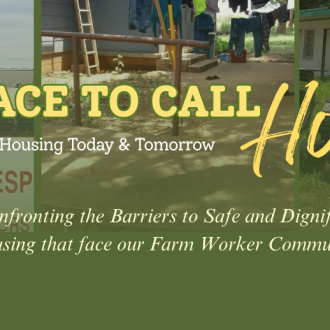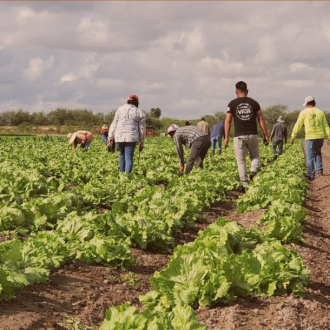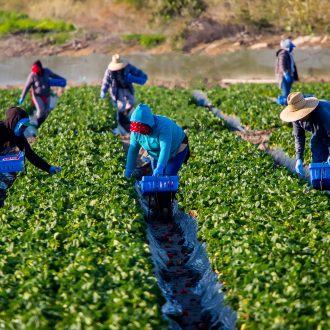(Modeled on Peace Hill Gathering 9/9/05 facilitated by Melinda Wiggins, Student Action with Farmworkers & Lori Fernald Khamala, National Farm Worker Ministry)
In advance:
- Prepare altar with candles, religious symbols, photos of farmworkers, and foods farmworkers pick
- Ask participants to bring a healthy, nourishing dish for potluck lunch
- Ask participants to bring stories or readings from their own faith traditions about food
- Bring a bell (or other) to break silence
9am-9:30 Gather & Welcome
- Introduce selves and why you came today
- Overview of the day
- Opening quote/theme (below): examining ways we are connected and disconnected from our food; nourishing ourselves physically and spiritually; connection between what we put in our bodies and how it gets there
Food is basic to life, and those who provide it enable us to live. Sharing food, the means to life and livelihood, is what a community does. Breaking bread implies that those of us who receive the food pledge ourselves to justice for those who provide it.
from “Hands of Harvest Hearts of Justice” (a farmworker curriculum by National Farm Worker Ministry and NC Council of Churches), Session 1 “Food: A Sacred Exchange” theme written by Sr. Evelyn Mattern
9:30-10:00 Centering Reading by Wendell Berry (below)
Sit in Silence
We can [not] live harmlessly or strictly at our own expense; we depend upon other creatures and survive by their deaths. To live, we must daily break the body and shed the blood of creation. The point is, when we do this knowingly, lovingly, skillfully, reverently, it is a sacrament; when we do it ignorantly, greedily, clumsily, destructively, it is a desecration…in such desecration, we condemn ourselves to spiritual and moral loneliness, and others to want.
from Wendell Berry, The Gift of Good Land (San Francisco: North Point Press, 1983, 1981), pp. 272-281 (I took it from page 12 of Food & Faith: Justice, Joy and Daily Bread, edited and compiled by Michael Schut of Earth Ministry, Denver, CO: Living the Good News, 2002)
10-10:30 Discussion–Food: A Sacred Exchange
- Overview/thoughts about the rituals of food (feast and fast) in our secular and spiritual lives and how those intersect
- Opening reading by Thomas Moore (below)
- Discussion of our faith traditions’ relationship to food: How does your own faith tradition connect with food, feasting and fasting?
- Share any readings participants have brought
- Open sharing of personal food rituals & how related to personal spirituality. Examples: Spiritual rituals: communion, Ramadan fasting, Jewish Passover Seder, Moravian Love Feast, table grace, church picnics. Secular (and secular as spiritual): shopping, eating around a table, gardening, farmers markets, family holiday gatherings, etc.
Reading by Thomas Moore*:
In fasting and in feasting, in proscriptions and blessings, religions around the world stress the importance of food for the soul, not just for the body. When I was a child, we ate fish on Friday and fasted for hours before communion and gave up certain food in Lent, and these simple food practices helped link religion with daily life in a simple but effective form of enchantment…
…Give us this day our daily crumb, our ice cream cone, our cherry pie. The slightest things–a walk, a word, a breeze, a passing view–please the soul immeasurably, and feed it. An dinner with a hint of imagination and effort, a tree bearing fruit outside the kitchen, a favorite market, an old recipe, can all feed the soul even as they nourish the body…
…Religion and poetry teach us how to recapture the soul in food, but we don’t have to “baptize” food by surrounding it with pomp and circumstance or elaborate symbolism. We could maintain food’s simplicity while at the same time safeguarding all the fantasy, memory, and emotion that are associated with or contained in it. Such ordinary activities as shopping, canning, boxing, making a pantry, and filling a shelf are rites of food that give as much to the soul as they do to the body.
* from pages 64-66 of The Interiority of Food by Thomas Moore, in Food & Faith: Justice, Joy and Daily Bread, edited and compiled by Michael Schut of Earth Ministry, Denver, CO: Living the Good News, 2002 (originally printed in Care of the Soul by Thomas Moore, 1992, HarperCollins).
10:30-10:45 Stretch Break to affirm the body, “God’s beloved creation”
Yoga may be appropriate if someone can lead the group
10:45-11:05 Sit in Silence
11:05-11:20 Preparation for meal & transition from food to labor
- Gather around altar of food and other items
- Ask participants to list all the hands that touch, for example, a tomato as it is planted by a farmer and trace its journey to being eaten on a hamburger in a fast food restaurant (remember planting, tending, picking, transporting, packaging, unwrapping, slicing, eating)
- Buddhist Meal Prayers: All participants say these together aloud
- Farmworker Communion: Pass around for participants to each read one paragraph aloud
1:20-12:00 Lunch
12:00-1:00 Silent Walking Meditation
Open the meditation by reading Cesar Chavez’s Fasts for Righteousness
1:00-1:30 Discussion–Politics of Food: Farmworker Issues
- Centering quote by Wendell Berry (below)
- Personal sharing by facilitators of how they got involved
- Farmworker statistics read aloud by participants by passing around sheet
- Farmworker quotes read aloud by participant volunteers
- Discussion and questions
Quote by Wendell Berry*:
Eaters…must understand that eating takes place inescapably in the world, that it is inescapably an agricultural act, and that how we eat determines, to a considerable extent, how the world is used.
* Page 249 from Food & Faith: Justice, Joy and Daily Bread, edited and compiled by Michael Schut of Earth Ministry, Denver, CO: Living the Good News, 2002
1:30-2 Closing
Farmworker issues are intertwined with farmer issues, environmental issues, consumer issues health issues and all is tied to our spirituality
- Participants brainstorm positive signs they have observed and offer alternatives for eating that is healthier spiritually. Examples might include: Community Supported Agriculture, new labor contract covering 8000 farmworkers in North Carolina offering them a voice for the first time ever, increase in organic produce, farmers’ markets etc.
- Closing reading (below)
- Closing moment of silence
Closing reading: A Word of Hope
Fundamentally, food and agriculture are about life: life for the hungry and for all who depend on farmers and farmworkers for what we eat every day. But they are also about life for farmworkers who risk their health to pick our food, sometimes not knowing what pesticides are in the field. They are about life for subsistence farmers in Africa trying to feed a family and make a meager living. They are about a way of life for farm families in the United States who are unable to meet debt payments and face selling a farm that has been in the family for generations. These reflections call all of us to make the protection of life and dignity the foundation for our choices on agriculture. We know these are not easy times, but as believers we have hope for the days ahead:
- We have the capacity to overcome hunger in our nation and around the world. What an achievement that would be!
- We stand with farmers, particularly those who own small and family farms here and abroad, in their struggle to live with dignity, to preserve a way of life, and to strengthen rural communities.
- We insist that agricultural workers be treated with dignity–decent wages, safe working conditions, and a real voice in the workplace.
- We advocate for creation to protect the fields and streams, which are gifts of God.
- We find in our faith–the lessons of Genesis, the passion of the prophets, and the words and life of Jesus–the ultimate source of hope.
* from page 14 of For I was Hungry & You Gave Me Food: Catholic Reflections on Food, Farmers, and Farmworkers. US Conference of Catholic Bishops, Washington, DC 2003.



